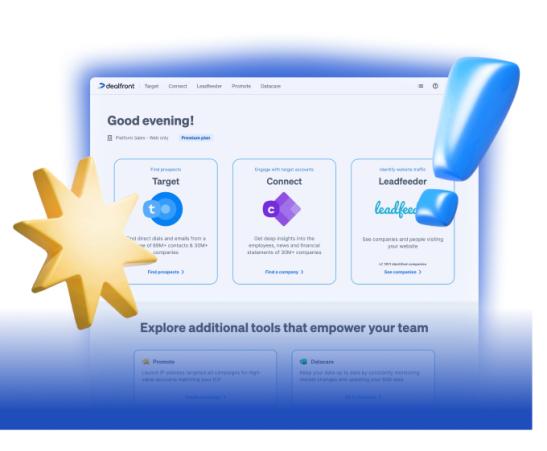As a B2B sales professional you will constantly be involved in outreach. You’re contacting new prospects, building relationships, engaging in selling via phone calls, emails and social media, handling objections, highlighting value, negotiating, closing deals and doing post-sales check-ins. It’s all outreach in one way or another!
With limited time and often limited budgets, a key challenge B2B sales professionals face is identifying relevant prospects to outreach to.
There are many different methods that can help, from identifying first and third party intent markers, to analyzing deep company data. Successful outreach requires the right knowledge and the right tools to stand out from the crowd.
However, we have something a little different for you. In this article we’ll explore a lesser known, and pretty unique, feature of the Dealfront platform: the Website Content filter.
In the next few paragraphs, we’ll offer practical insights and actionable tips for leveraging website content in your prospecting efforts.
What is the Website Content Filter?
The Website Content filter is a powerful feature within Dealfront’s Target tool, part of our comprehensive Sales Intelligence solution. It’s one of over 50 filtering options available, enabling you to segment our vast B2B database of over 180 million contacts and 40 million companies into highly actionable data.
Our Website Content filter allows you to perform precise searches for specific content on the websites of the companies held in the Dealfront database. This allows for highly targeted searches, ensuring you reach out to businesses with relevant interests or needs. However narrow your niche might be, the Website Content filter can help you find the companies you need.
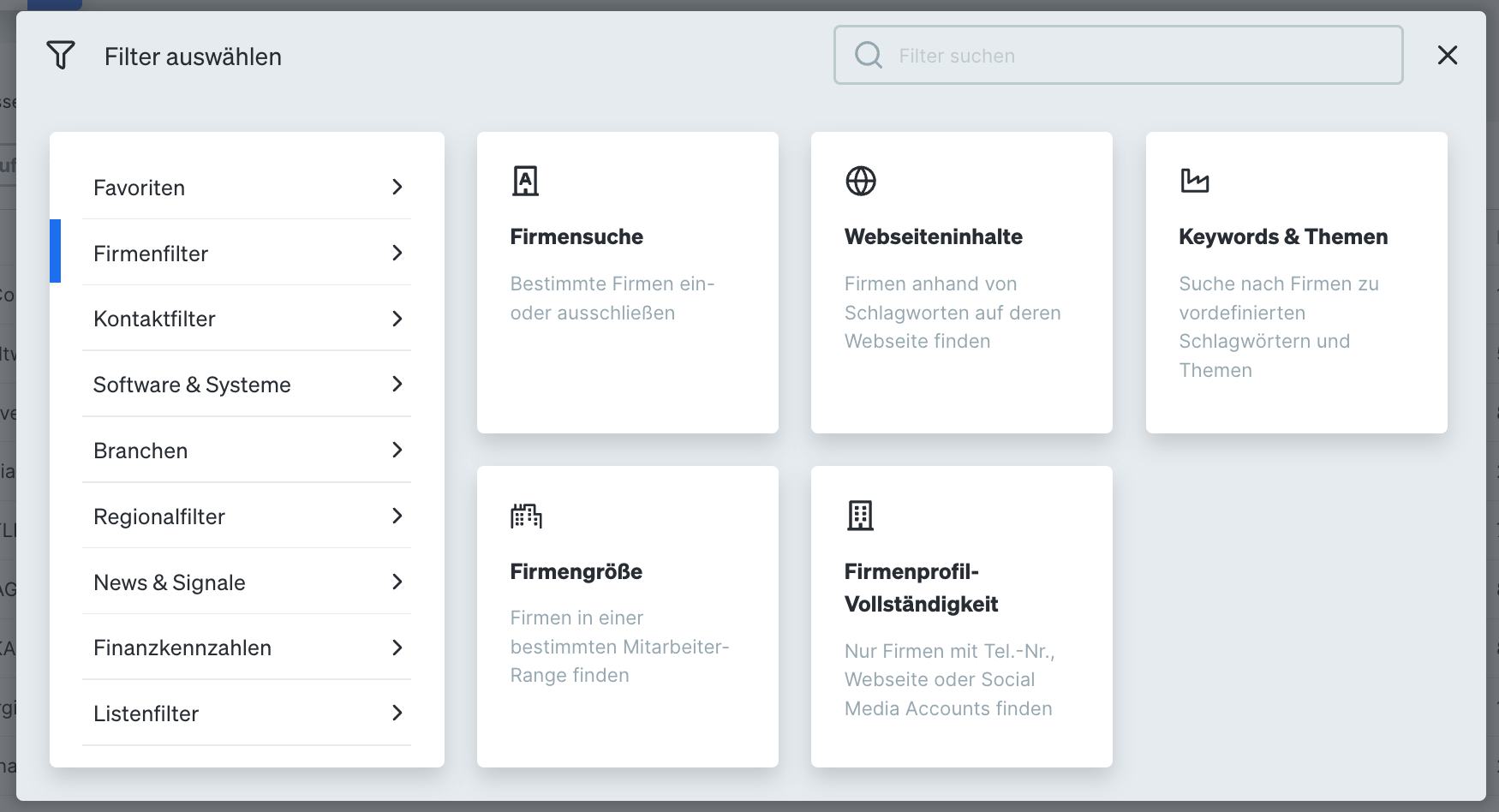
Screenshot: Where to find the Website Content filter in Target
This valuable tool enables you to find companies whose website includes certain words, or exclude companies whose website contains certain words. It’s a letter-by-letter comparison, looking for specific terms, rather than more generic keyword and category searches. You can also apply more advanced options to this filter, such as specifying individual URLs to search within, or types of URLs (e.g. Privacy pages). You can also search for words on a website by relevance, using Dealfront’s built in AI. Find detailed guidance on how the Website Content filter works in our Help Center.
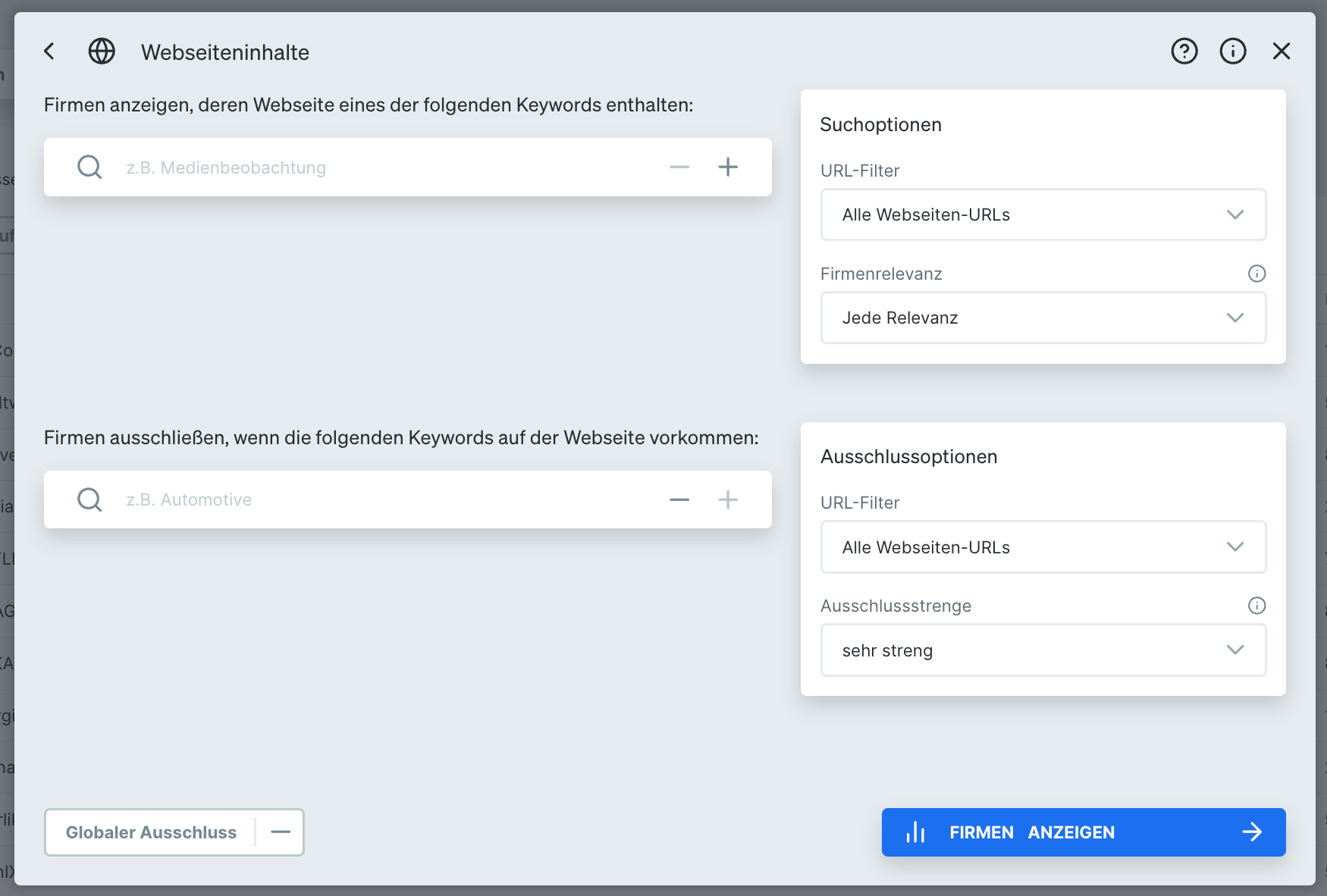
Screenshot: The Website Content filter in detail
The Website Content filter is just one way to narrow down prospects based on certain criteria. When combining this filter with the many others available, such as industry, location and company size, you get a much more refined search output. These results could be potential prospects that through outreach you go on to turn into leads and then customers.
9 Creative Ways to Incorporate Website Content into Your Outreach Strategy
Searching for companies with a certain keyword or phrase on their website might not sound like the most obvious way to refine your prospect list, but it has some highly valuable use cases! Below, we’ve detailed 9 key ways you can creatively incorporate website content into your outreach strategy.
In every use case below, you can also apply a combination of other filters in Target, this is how to build the most refined prospect list. You may want to use the Website Content filter, but only to search the websites of companies over 500 employees, in a certain location and specific industry. Once you have a list of your companies of interest, you can then define which contacts you want to reach out to using filters such as job title, department or hierarchy.
Use Case 1: Identify companies that use certain software and solutions
You can apply this use case from a few different angles. Firstly, in a complementary way. If your product or solution integrates seamlessly with a number of others to deliver even higher value, then being able to find companies that use this partner software should be a goal. It’s likely that there will be reference to the software and solutions used in a business within their privacy policy. Target’s Website Content filter lets you narrow down your URL search range to only the privacy-related URLs, so you’re not searching blindly across all pages.
Secondly, use your knowledge to capitalize on weaknesses. Perhaps a competitor product to your own has recently experienced a security breach, or you have a brand new feature they don’t yet have. If you know your prospects use lesser products or solutions than you can offer them, is there a tactful way to let them know that what you have is simply better? We’ll leave the skillful outreach to you, but being able to identify and work with areas of weakness can be very beneficial.
You can also use the Website Content filter to look within job ads for specific skills, qualifications or technology-usage requirements that your product or service can replace or enhance. Perhaps your company develops AI chatbot tools. These tools reduce hiring costs as they take away the need to hire more customer support reps. You could search within job ads for ‘intercom’, ‘zendesk’ or ‘freshworks’, to name a few - these are all live chat software providers. Don’t forget to apply any firmographic filters you need too!
Once you have your search results, you could then surmise that your tool could in fact replace the need to hire these people. Now you have a great reason to outreach to these companies in a highly targeted way.
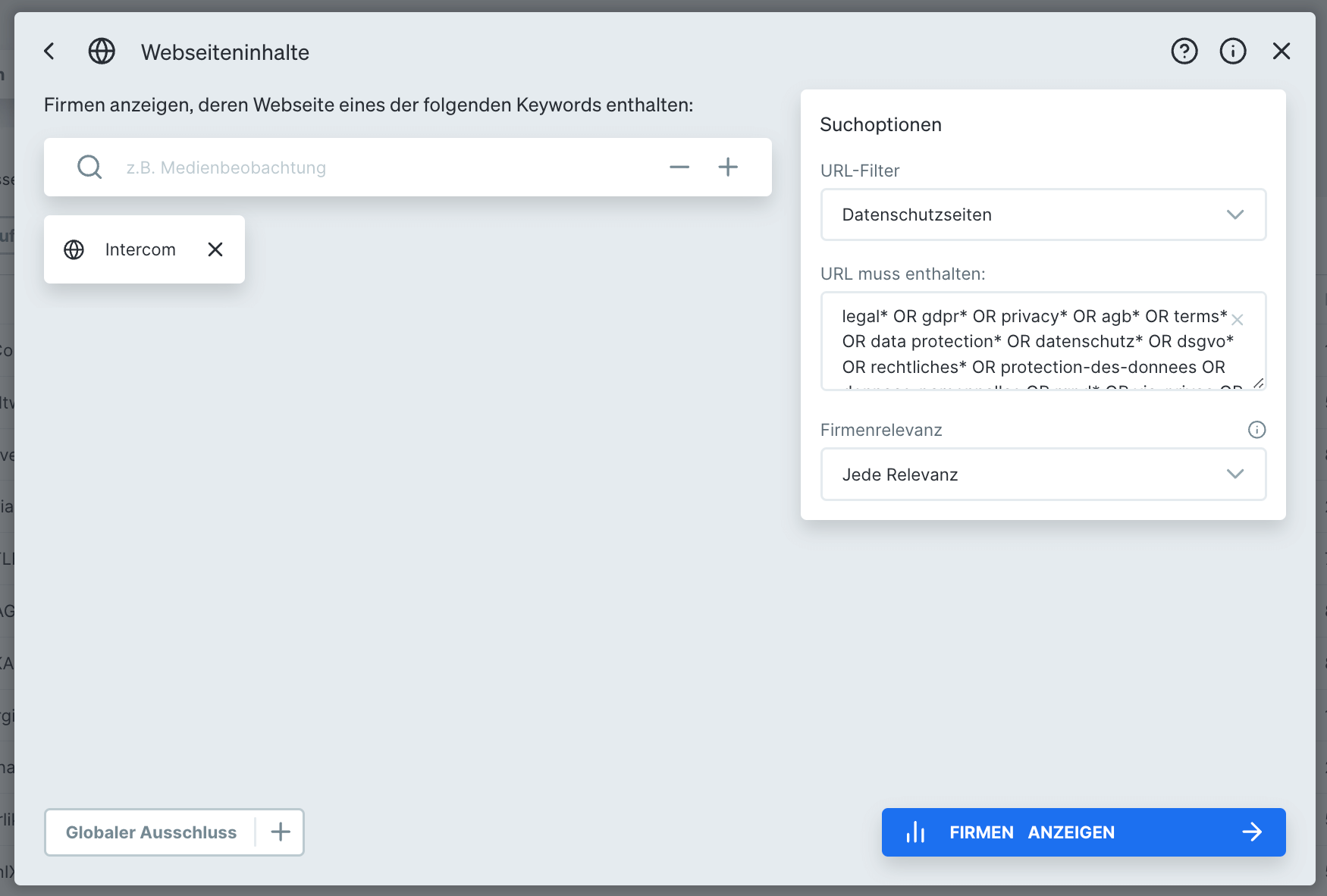
Screenshot: Narrowing down the URL search range to only Privacy pages
Use Case 2: Find companies with specific certifications or accreditations
Many companies put a lot of time and effort into obtaining particular certifications. They then rightly proudly display these on their websites. Achieving a certification can be a strong signal of commitment to excellence in a certain area. If your offering can be of value to boost this excellence, or support maintaining their standpoint, you’re in a good place to reach out.
Searching by certification applies to many different industries. You could be looking for an ISO achievement in quality management, food safety or IT security standards. Or a climate pledge around international sustainability standards. Or maybe you work in the HR field and seek prospective companies with a ‘Great Place to Work’ accreditation. Or your solution supports remote companies, so searching for a Flexa certification is insightful.
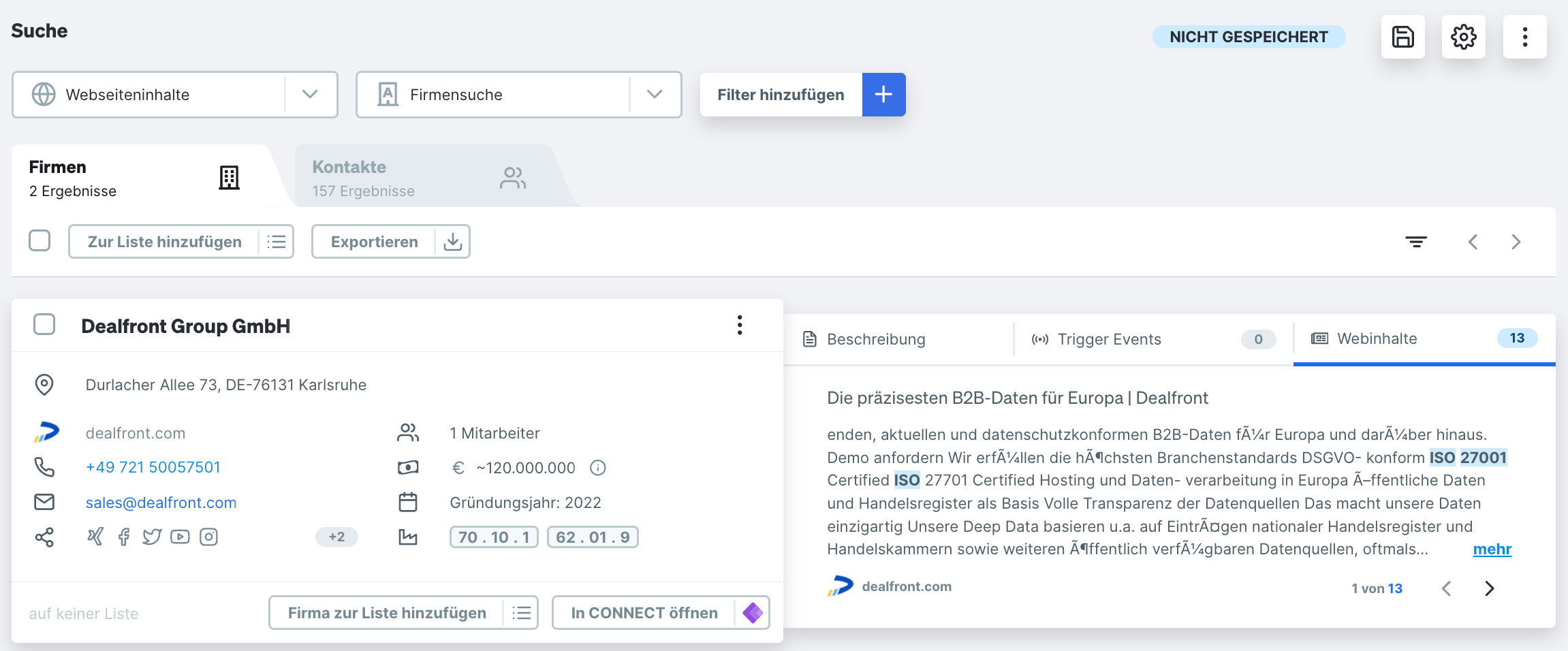
Screenshot: The Target Card View showing a search for the ISO 27001 achievement
Use Case 3: Find technographics within job listings
This is a key use case for those that work in recruitment. If you have valuable candidates on the books with highly specific skills, using the Website Content filter can help you uncover companies that use and therefore need these skills. This enables you to reach out and make connections before a job ad has even been placed, potentially placing you and your candidate at the front of the queue for the next available opening.
Get your candidates noticed quickly by matching their niche skills to the unique requirements of certain companies.
Use Case 4: Discover companies who partner with your competitors
If companies are partnering with your competitors, should they be partnering with you too? IT reseller businesses, for example, often sell multiple versions of the same solution. They won’t just offer their customers one brand of monitor, or one type of infrastructure security solution, unless they have an exclusivity deal of course. But if they’re stocking, promoting and selling your competitors, why aren’t you in the conversation too?
Searching for your competitors' names within a relevant industry and/or location can help present new sales avenues to uncover.
Use Case 5: Seek out locations of interest
You can apply filters to identify companies based on where they’re located, this is a common feature, but what about looking at location in a different way. Could it be useful to know with what locations a company does business, for example?
Logistics companies can benefit from this use case by identifying the shipping locations of manufacturing companies. Let’s use the example that you’re a logistics company who ships goods long-haul all across Europe. Your German sales team is looking to find more prospects in need of your solution. One search to perform could be for manufacturers, in Germany, with the website content search of ‘France’, ‘Spain’, ‘Croatia’, etc. You’re looking for words on their website that state delivery to multiple other European countries. They are likely to list where they ship to in their terms and conditions, or possibly on a location-related page.
Use Case 6: Understand company hierarchies
If you have a very specific decision maker to reach out to, understanding company hierarchies can help narrow down who this contact is. Running a website content search for an organizational structure or hierarchy chart can provide a quick way to understand who controls the budgets in a company or department. While you can of course search by job title, the remit of control differs per company, so in certain circumstances, assessing the company structure is where you’ll win.
Using the example of a manufacturing company, it might actually be the Head of Operations, or Operations Manager who makes decisions on new software to trial in both the finance and marketing departments if there aren’t actually persons of seniority in these two areas.
Use Case 7: Undertake marketing and competitor research
Website content can really help when it comes to carrying out wider research. In many companies you will have a trusty handful of key competitors - these are great to compare yourself to, but what if you want to cast your net wider? If you and your key competitors are only looking at each other, you could be missing out on what’s going on at other competitors, those who you may deem less important.
Searching for terms such as ‘review’, ‘case study’, ‘success story’, ‘testimonial’, and narrowing the other filters down to companies just like yours, will bring up some lesser known companies to dive deeper into. You can of course browse review sites as an alternative, but that relies on you having an extensive list of competitors in the first place. By combining the filters together you can build a comprehensive list in one go.
Marketing can use this technique for design, layout and content inspiration. Product and product marketing teams can also go into more depth on what features are highlighted, are there any ideas or improvements than can be gathered?
As is the purpose of this article, it’s very useful for sales as well of course. You might find case studies on competitor sites from prospects on your list - depending on the recency of this, this could alter your outreach approach. For instance if the review was several years ago, is it time for them to try someone new? Or if the review was a matter of months ago, does this make them a less attractive option to spend effort on? That’s for you to decide!
Use Case 8: Personalize your outreach
Personalized outreach is a key goal for every sales person. Having something that resonates with your intended target is one way of starting that relationship. Website content can help here too! Knowing a company uses a specific health management system, or has a strong affiliation to a certain charity, or offers certain perks to their employees can all be determined from searching for set words on company websites.
You can incorporate this knowledge into both your research phase and outreach tactics to form a stronger pool of potential prospects.
Use Case 9: Reveal companies who mention specific terms
Last but by no means least, you can use the Website Content filter to search for companies who have very specific terms on their website. This could be because your field is very niche, or you want to deeper refine the results.
As an example, if you’re in the manufacturing industry and make a very specific part for a certain combine harvester, you could use the name of this machine in your filter, to only see companies who list the name of this machine on their websites.
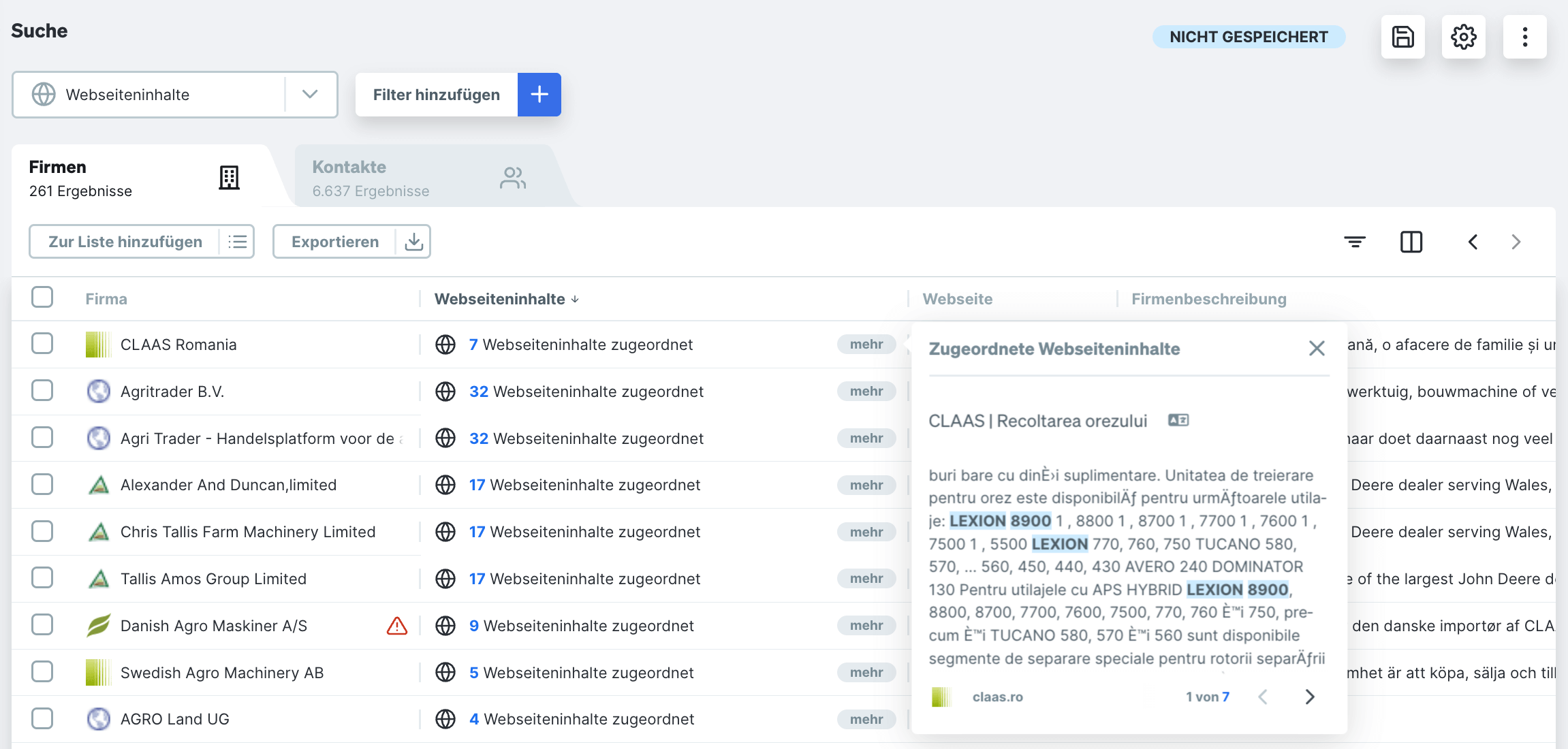
Screenshot: Target Table View of Website Content results
An alternative way to use the Website Content filter would be to delve deeper into micro industries. Our Industry filters go down a few levels, but you may want a quick way to refine these even further. If your target market is temperature controlled trucking companies, but by using other filters you can only go as far as ‘Freight transport by road’, adding in a website content search for ‘temperature controlled’ could help refine who you really want to speak to.
Get Ahead of the Competition by Using Website Content Data
In all of the use cases above you still need well-crafted, well thought out outreach techniques, materials and a skillful sales person. But with each bit of additional contextual information you’re increasing your chances of closing a deal - either today or further in the future.
By leveraging website content data effectively, companies can generate high-quality leads, improve conversion rates, and drive business growth.
In this article we’ve shared 9 ways searching for specific content on company websites can support your outreach goals. Acting effectively on the information you incover is where the success comes from.
Continue to do your prospect research as you would in any other circumstance, and pay attention to detail and understand what your prospect might actually want. Are you interpreting the information found on their website correctly to be in a position to reach out and communicate? Do you have something to say that adds value?
If you’re pulling all the information together with strong messaging that meets the unique needs of each prospect you should see your win rates increase versus other ‘scattered’ approaches.
If you’re not yet using our Sales Intelligence solution, why not book a no-obligation demo with our sales team. Discover more about our Sales Intelligence solution in our Help Center Quick Start Guide.
Stop wasting time contacting prospects at the wrong time and start using sales triggers today to outreach smarter, not harder. Grow your pipeline opportunities and increase your levels of success with Dealfront.

